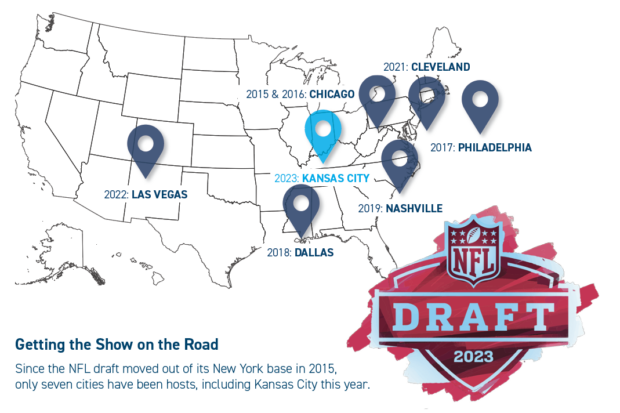HOME | ABOUT US | MEDIA KIT | CONTACT US | INQUIRE
HOME | ABOUT US | MEDIA KIT | CONTACT US | INQUIRE
This month’s NFL draft event will thrust the region—again—onto a national stage.

This is how far we’ve come: The National Football League, then just 16 years removed from its founding, conducted its first player draft on Feb. 8, 1936, at the Ritz-Carlton Hotel in Philadelphia.
It was instituted to give each team in the league the opportunity to secure talented players rather than have the wealthier teams monopolize those services. From a pool of just 90 players, the host city’s Eagles selected running back Jay Berwanger of the University of Chicago, the Heisman Trophy winner.
Did young Jay sign a life-altering contract? He did not. Instead, Berwanger opted for a career selling … foam rubber. He wasn’t alone: 56 of the 81 players drafted that day shunned professional football for careers with more stability—and better pay.
That will most decidedly not be the case on April 27, when the NFL begins three days of draft-related events in the annual traveling road show based at Kansas City’s Union Station. Since the league first televised the draft in 1980—and realized what a good thing it had been missing out on with viewers—the draft has become an increasingly glamorized event, with each year’s festivities attempting to outdo the previous year’s.
That puts Kansas City in a rare spotlight, and even within that space, a unique claim: Of the seven cities that have hosted the draft since the NFL made it a traveling road show in 2015, Kansas City is the first to claim host status just after its team won the Super Bowl.
From City Hall to the front office at 1 Arrowhead Drive, there’s general agreement that the 2023 NFL Draft will be Kansas City’s biggest sporting event ever—even if there’s no actual on-field competition. Bigger than the Chiefs’ Super Bowl victories in 1969, 2020 and this year; bigger than the Royals’ World Series championship seasons of 1985 and 2015.
“No one can really think of anything that would have been bigger,” said Kathy Nelson, president and CEO of the Kansas City Sports Commission and Visit KC. “This is probably the largest sporting event and—possibly even—the largest event our city has ever hosted.”
How big? Some projections by Visit KC suggest an economic impact on the city of more than $100 million, with visitor and local cash pouring into hotels, restaurants, retailers, transportation providers, and others.With 300,000 people estimated to attend various free events over the draft days, that spending will provide a boost to local authorities that levy sales taxes.
But it could be even bigger than that. If the weather cooperates—and that could be a big “if” during springtime in Kansas City—attendance might rival the record of 600,000 who showed up in Nashville in 2019.
The stage for all of that was set at the league owners’ meeting in the spring of 2019, and Kansas City didn’t earn host city status by accident. The Chiefs were coming off Patrick Mahomes first full season, one that took them to the brink of the Super Bowl before losing a heart-rending overtime AFC championship game to the New England Patriots. The team was a hot commodity, and the national wave of Mahomes Mania had to have the attention of those at the owners’ meeting.
Sundown on the event of that 2019 selection announcement saw the Kansas City skyline take on a crimson sheen, with buildings and landmarks lighted in red to celebrate.
Not without reason did NFL Commissioner Roger Goodell declare: “We know Chiefs fans will come out to celebrate along with thousands of fans from teams around the country for an incredible experience as we welcome the next generation of NFL players.”
Highlighting the three-day calendar—that is, beyond the actual pick-by-pick telecast—is the NFL Draft Experience, a massive, free festival that will let fans test their football skills, check out interactive exhibits, try their luck getting a treasured autograph, and take pictures with the Vince Lombardi Trophy, which goes to the Super Bowl champions each year.
“This is a historic day for Kansas City and Chiefs Kingdom, and we are thrilled to be named the host city for the 2023 NFL Draft,” Clark Hunt, the team’s chairman and CEO, gushed after the city’s selection. He credited Kathy Nelson, CEO of the Kansas City Sports Commission and Foundation, as well as civic leaders for helping secure the owners’ blessing. “It was a tremendous team effort, and we look forward to continuing to work together to showcase Kansas City on the national stage,” Hunt said. “Chiefs Kingdom is home to the most passionate fans in the world, and I know they will make Kansas City proud as the host of one of the NFL’s premiere events.”
Nelson, as well, acknowledged the passion of Chiefs fans.
“Hometown pride runs deep in the Midwest,” she said. “We are excited to show the world our unparalleled passion for sports—especially our passion for professional football. Fans from every corner of the country should look forward to experiencing Kansas City’s hospitality, our vibrant food scene, innovative neighborhoods, historic attractions, and a whole lot of fun in 2023.
Now one of the biggest draws in sports television, the draft will give Kansas City a chance to strut its attributes to a monstrous audience. The 2019 draft set a record with 47.5 million total viewers, nearly half the size of a Super Bowl telecast audience.